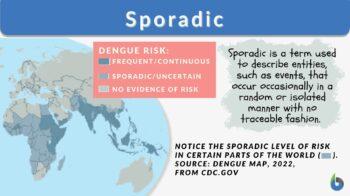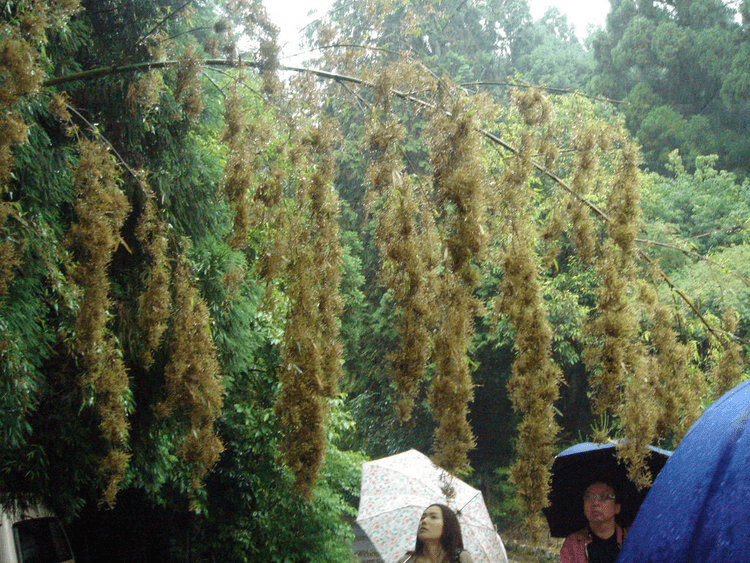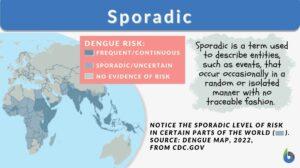
Sporadic
adj., [spəˈɹæd.ɪk]
Definition: Occurring occasionally in a random or isolated manner
Table of Contents
Events, diseases, behaviors, infections, flowering… all of these happen at different frequencies and manners in the world. While some of these can happen at regular intervals and in a defined fashion, some others happen occasionally, abruptly, and in sudden bursts. Such events which occur occasionally in a random or isolated manner with no traceable fashion are popularly defined as sporadic. So, when someone asks what sporadic means, we can define it like this by contrasting it with regular, cyclical, and endemic things.
Sporadic Definition
When asked to define sporadic, one has to understand the context in which the question has been put ahead. Let’s try to define the term and understand its usage.
- In the general biology context, the term “sporadic” is used to define biological entities, events, and processes that have a more random and less frequent distribution across both space and time scales. The scattered sort of distribution and sudden plus isolated bursts of various biological events are termed sporadic.
- In a medical context, sporadic is defined as the sudden and unpredictable occurrence of some disease or infection. This term is commonly used by pathologists to determine the category of infections based on the frequency and fashion of their occurrences.
- In epidemiology, the term sporadic is used to define diseases that are witnessed only occasionally. Sporadic infections or diseases usually don’t have a geographic concentration in any part of the world. They can spurt abruptly in any corner of the world at any given point of time and year. They aren’t seasonal or endemic to a place. Some examples of sporadic infections and diseases are tetanus, rabies, plague, etc.
Etymology of “sporadic”
The word sporadic has a very long history. It has been derived from the medieval Latin word “speirein” meaning “to sow”, which has been further derived from an older Greek word “sporadikos”, which has been further derived from an even older Greek word “sporas/sporad” meaning scattered. The term sporadic relates to the word spore too in the sense that spores, which are the very basic reproductive cells in various forms of life like fungus, some plants, microorganisms, etc. by their nature are “scattered in nature”. On the same line, sporadic also stands for the events, processes, diseases, and biological occurrences that are ‘scattered by their nature.
Synonyms of Sporadic
There are many words synonymous with sporadic. Some of them are aperiodic, infrequent, irregular, unsteady, isolated, episodic (also episodical), rare, spasmodic, occasional, spastic, and odd. All these terms, though synonymous to sporadic, have their individual specific usages. Not at every place and context, you can replace sporadic with rare and infrequent. This is because rare, infrequent, occasional, and isolated convey the meaning of ‘something not being so common’ or ‘something occurring at a low frequency’. On the other hand, sporadic conveys the meaning of ‘happening in spurts and bursts’ or ‘something happening very suddenly without any predictability’.
Antonyms of Sporadic
Some words that convey the opposite meaning of sporadic are regular, stable, even, uniform, etc. These words lay emphasis on the ‘frequent occurrence or timed occurrence of some event”. Contrastingly, sporadic lays emphasis on the ‘unpredictable nature of events’ or ‘events that occur all of a sudden, in spurts, or as unpredictable outbursts’.
Watch this vid about the various uses of sporadic
Sporadic means neither endemic nor epidemic, occurring occasionally in a random or isolated manner.
Sporadic Examples
Let’s try to list some examples where the usage of the term sporadic is clear. These examples should help in bringing clarity about this term to you.
- Sporadic events: Sporadic events are those events that happen aperiodically and offer the bare minimum time for the respondents to assess the situation and act. Such sporadic events can be better dealt with if the respondents have some knack to predict such events. Since, the entire software and IT world functions on the machines and their accuracy, sporadic failure of machines are thus predicted in order to stay well prepared for the times of unfortunate machinery failures and jitter. (Ref. 2)
- Sporadic diseases: Sporadic diseases are those diseases that happen infrequently and haphazardly. Their chances of occurrence are irregular and very occasional. They aren’t temporally or spatially restricted. They can happen anytime or anywhere in contrast to epidemic or endemic diseases which have a clear and discernible pattern. Some examples of sporadic diseases from the USA are tetanus and plague. Since the maximum population of the United States is properly vaccinated against causative bacteria of Tetanus, “Clostridium tetani”, the events of this disease are not common but rather sporadic.

- Sporadic flowering: Sporadic flowering is observed in some species of plants like bamboo (Bambusa vulgaris). Plants have different types of flowering habits. Some flower in a synchronized fashion while others flower sporadically while there are some more that show a mixture of both of these flowering habits. Bamboo is one such plant. It has 4 different types of flowering habits. One of them is sporadic. Sporadic flowering refers to a random and non-gregarious way of flowering. Some examples of bamboo that display sporadic flowering are Fargesia and Pseudosasa.

Answer the quiz below to check what you have learned so far about sporadic.
References
- Riley L. W. (2019). Differentiating Epidemic from Endemic or Sporadic Infectious Disease Occurrence. Microbiology spectrum, 7(4), 10.1128/microbiolspec.AME-0007-2019. https://doi.org/10.1128/microbiolspec.AME-0007-2019
- POSIX1003.1d-1999 “IEEE Standard for Information Technology-Portable Operating System Interface (POSIX)-Part 1: System Application Program Interface (API)-Amendment d: Additional Realtime Extensions [C Language]”
- Home – SA Main Site. (2022, January 30). SA Main Site. https://standards.ieee.org/catalog/olis/posix.html
- Zheng, X., Lin, S., Fu, H., Wan, Y., & Ding, Y. (2020). The Bamboo Flowering Cycle Sheds Light on Flowering Diversity. Frontiers in plant science, 11, 381. https://doi.org/10.3389/fpls.2020.00381
©BiologyOnline.com. Content provided and moderated by Biology Online Editors.








